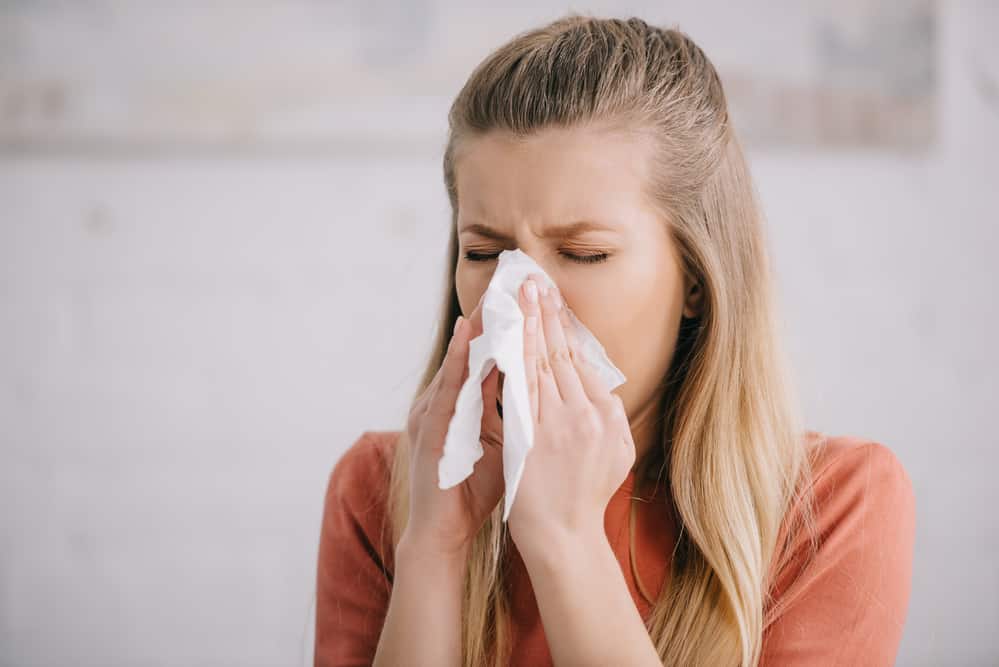The COVID-19 pandemic has prompted a boom in immunology research. One research question is whether a previous infection with a common-cold coronavirus helps the body mount an immune response to SARS-CoV-2. Known as antigenic or immune imprinting, the phenomenon has been studied since Thomas Francis, Jr. first described it in the 1960s.
Here is how imprinting works: like a common cold, catching the flu as a child makes some people better equipped to fight off a flu virus later if the strain of the virus is similar to the one that caused the original infection. This is because the immune system is programmed by the initial infection to recognize the pathogen and produce antibodies against it. If a flu virus that shares specific epitopes with the initial strain enters the body, the immune system is primed to respond.
Some evidence suggests that common-cold coronaviruses may similarly prime people to produce an immune response to SARS-CoV-2, and yet other research seems to suggest the opposite, that such previous infections may reduce immunity to the virus. For now, no clear conclusion exists, and scientists are still debating the implications for future COVID-19 vaccines.
Potential Immunity Boost?
Research examining antibodies in blood serum samples collected before the pandemic provides a hint about the potential immune benefit conferred by exposure to other coronaviruses. One such study showed that antibodies against a common-cold coronavirus called OC43 could bind to the SARS-CoV-2 spike protein. The
University of Pennsylvania research team found that about 20 percent of study participants had these antibodies before the pandemic. The researchers also compared antibody levels in people before and after infection with SARS-CoV-2. After infection, they found increased production of antibodies against OC43 but noted that they could not prevent SARS-CoV-2 viruses from entering cells.
Scott Hensley, who lead the research, noted in a press release that, “Although antibodies from prior coronavirus infections cannot prevent SARS-CoV-2 infections, it is possible that pre-existing memory B cells and T cells could potentially provide some level of protection or at least reduce the disease severity of COVID-19.”
Potential Immunity Drain?
A counter hypothesis suggests that exposure to other coronaviruses may diminish immunity against SARS-CoV-2. This can happen if the antibodies produced as the result of a previous infection do not match well with the new virus. At the same time, the production of ineffective antibodies can suppress the activation of B cells that would otherwise pump out more useful antibodies.
A study that examined antibodies in people hospitalized with COVID-19 in Spain may illustrate this mechanism. The research, led by Adolfo Garcia-Sastre, director of the Global Health and Emerging Pathogens Institute at the Icahn School of Medicine at Mount Sinai, found a slight correlation between higher antibody production against common cold coronaviruses and less immunity to SARS-CoV-2.
Research that appeared in a preprint in May also reported a potential negative correlation between antibody production and COVID-19 disease outcome. The study was based on samples taken from people in the United Kingdom in 2020. It found that people who died from COVID-19 had the same number of antibodies for the virus’s nucleocapsid protein – but had fewer antibodies against the spike protein than those who were infected and survived. Craig Thompson, a virologist at the University of Oxford who led the research, suggests that the immune system’s memory of the previous coronavirus’ spike protein inhibited a stronger immune response to the new virus.
Vaccine Implications
Despite the lack of clarity, the research findings may have implications for future COVID-19 vaccine development. Seasonal flu vaccines are updated each year to target the strain most likely to be prevalent. However, the vaccine’s effectiveness can be diminished if a person’s immune system is still on the lookout for a flu virus it responded to previously. “It looks like they’re not really mounting a response to the thing
that we carefully updated the vaccine for,” said Sarah Cobey, an evolutionary biologist and flu researcher at the University of Chicago.
Could this be a problem for vaccines as new COVID strains emerge? Hensley hopes not. “Maybe in the context of mRNA vaccines there’s not really going to be as much biasing towards conserved epitopes. That’s the hope,” he said.
No Clear Conclusion
The researchers agree that further study is needed before any conclusions about the effects of immune imprinting can be drawn. “There likely is a very complicated interplay between seasonal coronavirus infection and disease outcome upon SARS-CoV-2 infection,” says Hensley. “I don’t think anything should be pitched as complete fact at this point.”
Did you enjoy this blog post? Check out our other COVID-related blog posts or features on our Webinar page
QPS is a CLIA-certified GLP- and GCP-compliant contract research organization (CRO) delivering the highest grade of discovery, preclinical and clinical drug research development services. Since 1995, it has grown from a tiny bioanalysis shop to a full-service CRO with 1,100+ employees in the U.S., Europe and Asia. Today, QPS offers expanded pharmaceutical contract R&D services with special expertise in neuropharmacology, DMPK, toxicology, bioanalysis, translational medicine and clinical development. An award-winning leader focused on bioanalytics and clinical trials, QPS is known for proven quality standards, technical expertise, a flexible approach to research, client satisfaction and turnkey laboratories and facilities. Through continual enhancements in capacities and resources, QPS stands tall in its commitment to delivering superior quality, skilled performance and trusted service to its valued customers. For more information, visit www.qps.com or email info@qps.com.








